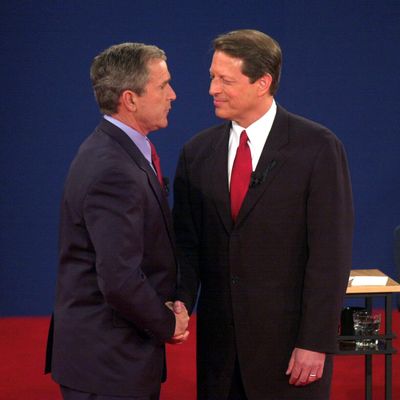
Even before the third presidential debate made Donald Trump’s refusal to abide by the election outcome the election’s central question, conservatives are already preparing a defense of sorts. Trump’s wild ravings about the rigged election, they insisted, were hardly any different from complaints by various liberals about the 2000 election. This has become a nearly consensus talking point on the right, as it conveniently united both the pro- and anti-Trump factions within the Republican Party in their belief that Trump has done nothing worse than what the hated Al Gore did. “Democrats forget everything that they’ve been saying on their blogs, in their newspapers, in their magazines over the past 16 years,” cries television blowhard Joe Scarborough. “This holier-than-thou attitude, this is the first time that anyone has suggested the election is not a sacrosanct process, it’s a joke! So you guys bathe in that hypocrisy if you want to.”
There is an enormous amount of ignorance packed together in Scarborough’s rant. It is worth pulling together the misconceptions piled atop each other and examining them individually.
1. Al Gore did not challenge the validity of the election process. He participated in it. Recounts for extremely close races are part of how elections work. Of course, the Bush campaign attempted to discredit Gore’s challenges by making the case that he was a sore loser for pursuing the vote count to which he was entitled under Florida law. But neither party actually believes candidates should be prevented from pursuing recounts in the case of sufficiently close races — Republicans do it, too. Casting Gore as “disputing” the “result” of the election is political spin from Bush’s campaign that has been repurposed for defending Trump. Gore followed the process through entirely legal channels, and, when the recount was halted, graciously conceded. The only significant extralegal behavior by either party was the dispatch of a Republican mob to a courthouse in Miami to shut down a recount they (erroneously) believed would help Gore.
2. Respecting democratic outcomes does not, contrary to Scarborough, mean insisting that an election has never been rigged. To state the most obvious fact, almost every election in the South from the end of Reconstruction through the mid-1960s was completely rigged by systematic disenfranchisement of African-Americans. Scarborough’s mockery — “this is the first time that anyone has suggested the election is not a sacrosanct process”! — is a pure straw man.
3. It is not only legitimate but factually true to point out that the 2000 Florida recount failed to produce an outcome that matched the discernible preferences of the plurality of the voters. Many voters failed to have their votes counted due to innocent mistakes stemming from faulty ballot design, or semi-innocently, as a result of Jeb Bush’s overly broad purge that disenfranchised thousands of voters as felons when they were not. More important, the full statewide examination of ballots ordered by the Florida supreme court would have found enough ballots with Al Gore’s name both punched and written in (and thus discarded by machines) to award him the state. A combination of bad-faith maneuvering by Florida election officials and a laughably partisan Supreme Court ruling halted this recount.
4. The conservative line relies on lumping together Gore, who followed the process and conceded afterward, with his supporters, many of whom disputed the fairness of the process afterward. Those are different things. It also conflates the 2000 recount, where Republican officials prevented the recount that would have elected Gore, with the 2004 election, which Bush won fairly (despite the conspiracy theories promoted by a handful of marginal left-wing cranks).
5. Trump’s dispute of the election’s fairness is embedded in a party-wide hallucination about systemic voter fraud. This belief supports a systematic effort by Republicans to suppress minority voting through the erection of bureaucratic hurdles. Republican election policy is to create the modern equivalent of poll taxes, with the tax taking the form of time to navigate state bureaucracies rather than money. (The modern version of the poll tax is actually more burdensome than the old one.) Republican legislators have literally been proven in court to have designed restrictions for the express purpose of holding down the nonwhite vote.
6. Trump is delegitimizing the election on the basis of evidence-free conspiracy theories. This serves two purposes. It justifies the Republican policy of suppressing minority votes, and it allows Trump to frame his loss as a betrayal and, as his advisers are hinting, use the alleged theft of the election to build his brand going forward at the expense of the regular party. Republicans support the first motive while finding the second understandably terrifying.
Democracy has been contested in American politics since the origins of the republic, and the fight usually concerns the right of marginal groups to access the franchise on an equal basis. Pretending all elections in American history have been sacrosanct, and only lunatics like Al Gore have said otherwise, conveniently wipes away both the history and the ongoing reality of conservative restrictions of the franchise, while separating the Republican Party from the dangerously schismatic ravings of its presidential nominee.






























